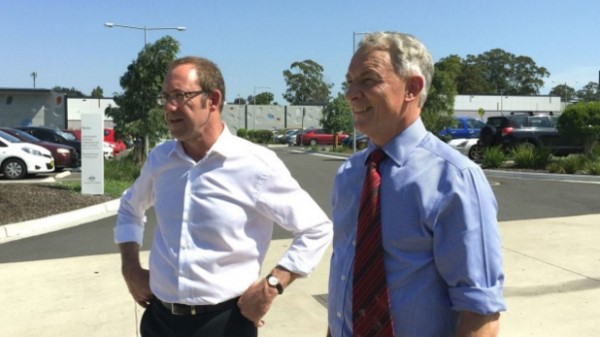Stories of detained Kiwis show 'crude' nature of deportations

26 November 2015
Sam Sachdeva in Sydney - Stuff
Labour leader Andrew Little says he will see whether any Kiwis being held at a Sydney detention centre need support.
The stories of Kiwis being held at an Australian detention centre has reinforced Labour leader Andrew Little's concerns about the “crude” nature of its controversial detention and deportation policy.
Little and Labour MP Phil Goff are at the Villawood Immigration Detention Centre in Sydney to meet a few of the more than 60 Kiwis being held there.
Hundreds of Kiwis living in Australia are facing detention and deportation to a country where they have not lived for years, after the Australian government tightened its visa cancellation rules.
Twelve detainees arrived on a flight last week, and more have arrived on another flight on Thursday morning.
Media were kept to the perimeter of the Villawood centre, ringed by wire fences in an isolated industrial area, and closely monitored by security personnel.
Little said the conditions at the centre were good, but did not take away from the fact that many Kiwis with minor offences were being held there without good reason.
“There's room to move around in, it's tidy, a little impersonal, a little clinical, plenty of space for visiting family and people to come in. It does remind you that when family come here, they don't know whether the person they're meeting up with…is going to be there much longer.”
He spoke to three Kiwi detainees, who had moved to Australia while they were children or teenagers, and had only minor driving or drug offences.
One detainee had only limited visits to his dying partner while he was locked up, while another's mother was also unwell.
“What it tells you is that the law of mandatory revocation and detention is too crude a response to some of the situations these guys are in. Lives go on hold, families are disrupted, and in the end you just wonder what it's all for.”
Not Humane, Necessary or Right
Goff said it was unfair to separate low-risk offenders from their families for months and send them back to a country they had no ties to.
“If it's a serious offence then yes, maybe they deserve it, but for a low-level offence to be sent to a country that's not your home because you've not lived there for 20, 30, 40 years, and to be separated from your dependent children…it's not humane, it's not necessary and it's not right.”
Little added: “One of the guys said, 'If you're going to send me to New Zealand you might as well send me to China - I have just as much connection with New Zealand as any other country in the world'.
“All his life, all his work and all his family are here.”
Little said he would talk to Australian immigration minister Peter Dutton about improving the transparency and timeliness of the appeal process, and would help the detainees to get clarity on their situation.
“Hearing their cases and what Peter Dutton said to us yesterday, I'd be surprised if at least one or two, maybe all three of them don't have their [visa] revocations overturned.”
Asked earlier whether he was concerned about whether people would see the trip as negative, given the planeloads of offenders arriving back in New Zealand and Prime Minister John Key accusing Labour of “backing the rapists”, Little said it was about ensuring Kiwis were treated fairly.
“This is about Kiwis who are being caught up in a rule that is being applied pretty bluntly and many have fallen through the cracks and they don't have any voice - no-one from the New Zealand government is taking any action to make sure that they're being treated properly.
“They might have been born there, but they haven't been there for many years and their home is Australia.”
No Eureka Moment
Little had earlier said there was “no eureka moment” during a meeting with Australian immigration minister Peter Dutton on Wednesday to discuss the topic.
Little met Dutton to advocate for more leniency in the visa laws, but said there was little movement from the minister.
“We talked about what we considered the issue but he maintained a pretty firm line.
“There wasn't a sort of eureka moment where he said, 'Oh no, I've got it all wrong', it certainly wasn't that.”
However, he said Dutton was willing to look at individual cases where the rules appeared to be applied in “a particularly harsh way”.
“A couple of cases we gave examples of and he expressed a willingness to look at them.”
Dutton had provided figures showing that of 40 visa cancellation appeals, 20 had led to the decision being overturned, but Little said the numbers “seem quite small compared to the information we're getting”.
The main purpose of Little's visit is to speak out about the rights of 250,000 to 300,000 Kiwis living in Australia on special visas that deny them access to some government services and a path to citizenship.